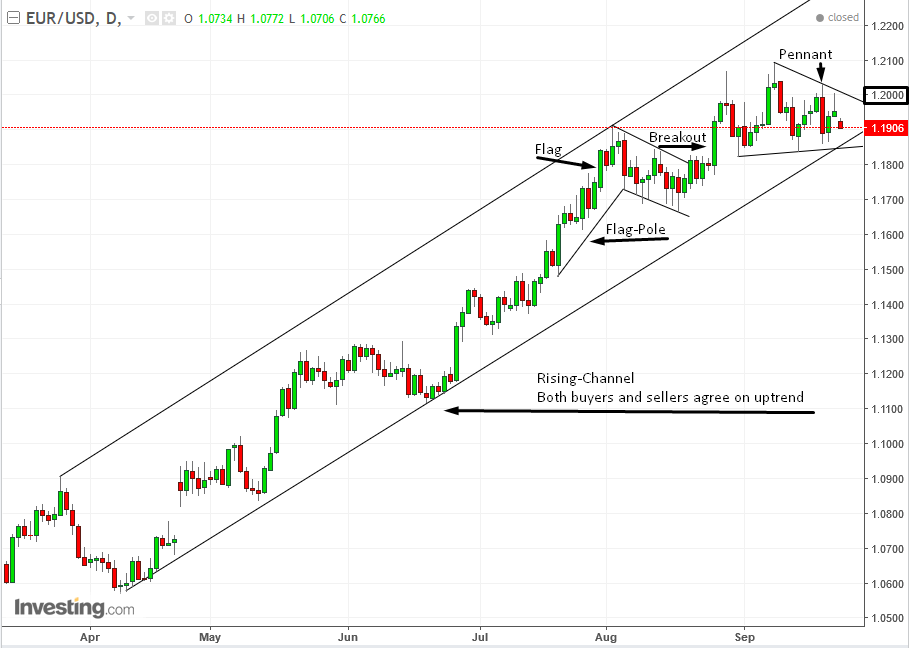Chart Of The Day: Euro Uncertainty Rises After German Election
Investing.com | Sep 25, 2017 10:01AM ET
By Pinchas Cohen
Investors Unconvinced Inflation Will Rise
While a return from an economy that is supported by near-zero interest rates and QE should be an expression of faith in the economy, it doesn’t seem like dollar, bond and gold investors are buying it, as the market remains unconvinced inflation will rise and allow the Fed to raise rates as much as has been forecast. Moreover, even if investors would buy into the Fed’s ambitious path to higher interest-rates, it will make money more expensive for investors with which to continue to prop up equity record highs. Additionally, ongoing tensions with North Korea scare investors into safe havens.
All of which has, up until now, buoyed the euro. But in an era when election surprises have become somewhat, well, unsurprising, yesterday's not fully anticipated German election results may have unmoored the single currency.
Historic German Election
While Angela Merkel’s historic fourth term as Germany's chancellor increases stability (and therefore certainty) for markets, another historic event was also brought about by yesterday's elections in Germany. For the first time in 60-years a far-right party won representation in the country's Bundestag, as the populist, Alternative for Germany (AfD) party gained 13-percent of the vote, making them the third strongest party in the country.
The AdF win shines a light on two critical uncertainties for Germany and Europe. First, it may take Merkel months to form a coalition. Second, this far-right victory solidifies a shift toward populism that have already swept Finland, Britain, Austria, Italy and – of course – the US. Populist parties are of course anti-EU, elevating euro risk.
Euro in an Uptrend

The EURUSD has been trading within a rising channel, in which both buyers and sellers agree that prices should rise, as both are buying and selling at ever increasing prices.
During August, the price traded within a continuation pattern called a“falling flag,” in which traders take profit while they catch their breath from previous, sharp moves, such as the July 8 price of 1.1500, which forms the flag’s “pole,” to the August 2, 1.1911 end of the move, or pole top. The flag’s upside breakout suggests a minimum repeat of the pole’s move, 425 pips. However, from the August 25 breakout from 1.1800, the price rose only to 1.2100, providing only a 290-pip move, 135 pips short. This may suggest there is more gunpowder available for another shot.
Since September 8, the pair has been trading within another continuation pattern called a “pennant,” a small triangle, demonstrating a pause within the uptrend. At this point, traders take profit and wait for a signal of a continuation, which is triggered by an upside breakout, with the close above 1.2000.
Trading Strategies
Conservative traders would wait on a long-entry for the price to break through the pattern, with a 3-percent filter to 1.2350 and a return move, in which the pattern will prove its support for at least three days after the breakout.
Moderate traders would wait on a long-entry with an upside breakout and a 2-percent filter to 1.2240, with a return move which would successfully retest the pattern, with at least 2-days above 1.2000.
Aggressive traders would wait on a long-entry for an upside breakout and a 1-percent filter to 1.2120 and know that a return-move is probable, and therefore accept the potential loss or place a stop-loss beneath 1.2000, and if possible, beneath 1.1900.
Very aggressive traders may enter a long position now – counting on the bottom of the pattern for support – with a stop-loss beneath 1.1840.
Amateur traders would jump in, with no plan or no idea of the risks involved and then say that trading is gambling, when in fact it's simply that they are the gamblers.
Trading in financial instruments and/or cryptocurrencies involves high risks including the risk of losing some, or all, of your investment amount, and may not be suitable for all investors. Prices of cryptocurrencies are extremely volatile and may be affected by external factors such as financial, regulatory or political events. Trading on margin increases the financial risks.
Before deciding to trade in financial instrument or cryptocurrencies you should be fully informed of the risks and costs associated with trading the financial markets, carefully consider your investment objectives, level of experience, and risk appetite, and seek professional advice where needed.
Fusion Media would like to remind you that the data contained in this website is not necessarily real-time nor accurate. The data and prices on the website are not necessarily provided by any market or exchange, but may be provided by market makers, and so prices may not be accurate and may differ from the actual price at any given market, meaning prices are indicative and not appropriate for trading purposes. Fusion Media and any provider of the data contained in this website will not accept liability for any loss or damage as a result of your trading, or your reliance on the information contained within this website.
It is prohibited to use, store, reproduce, display, modify, transmit or distribute the data contained in this website without the explicit prior written permission of Fusion Media and/or the data provider. All intellectual property rights are reserved by the providers and/or the exchange providing the data contained in this website.
Fusion Media may be compensated by the advertisers that appear on the website, based on your interaction with the advertisements or advertisers.